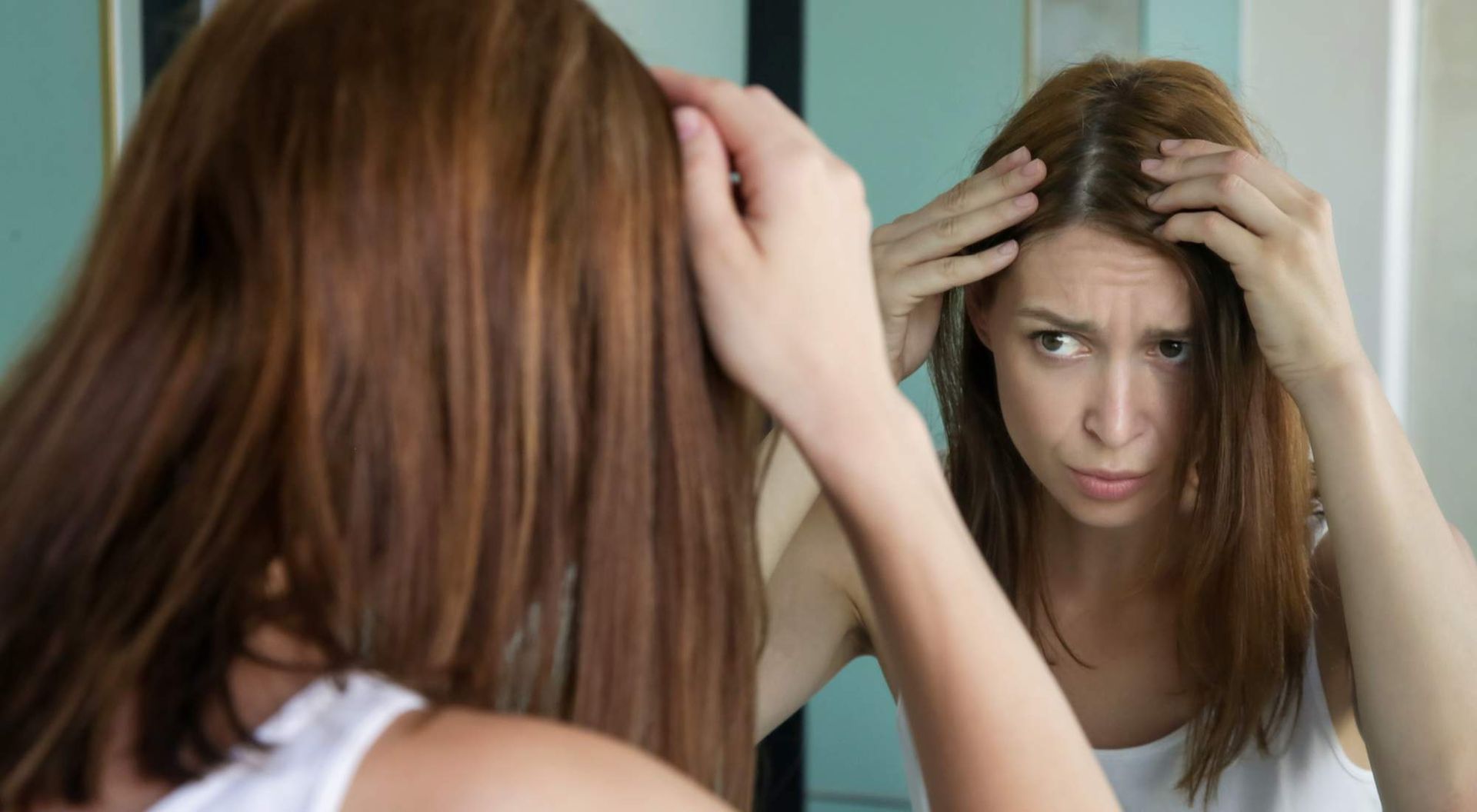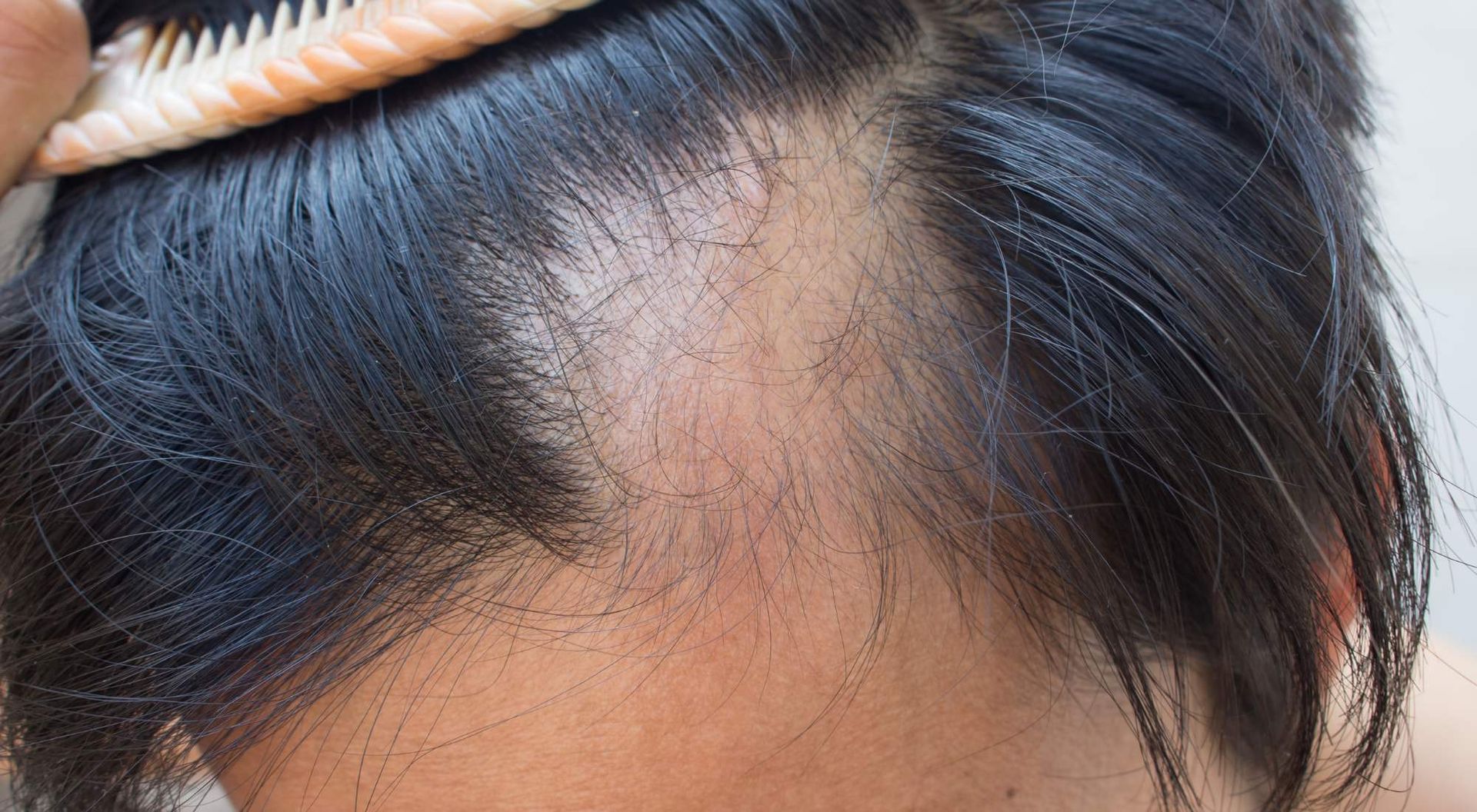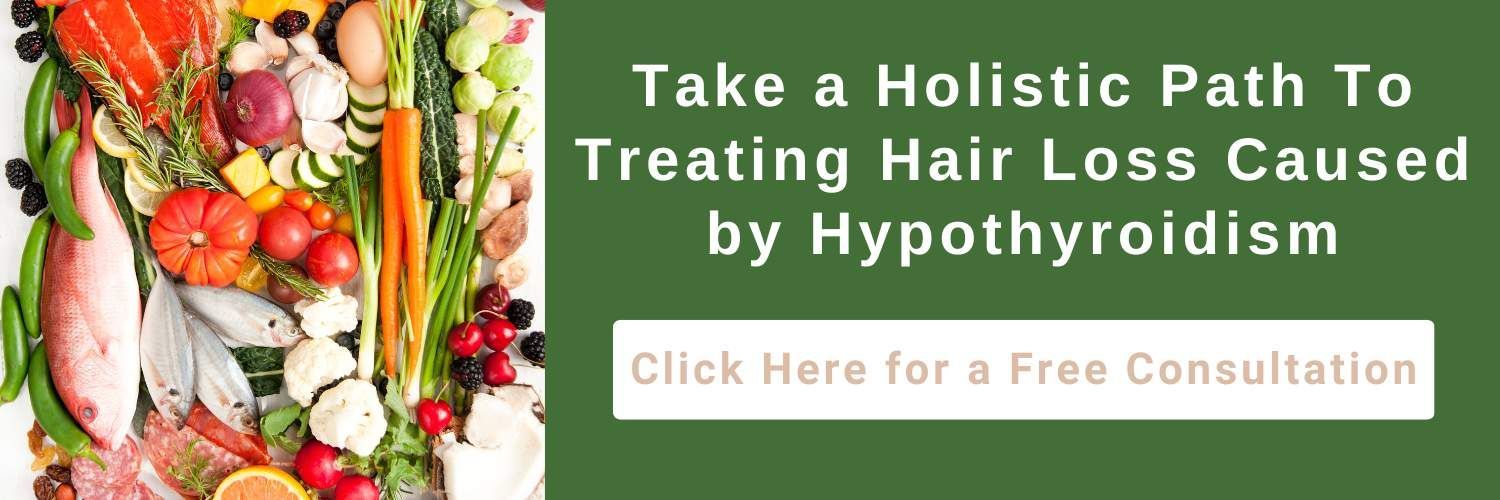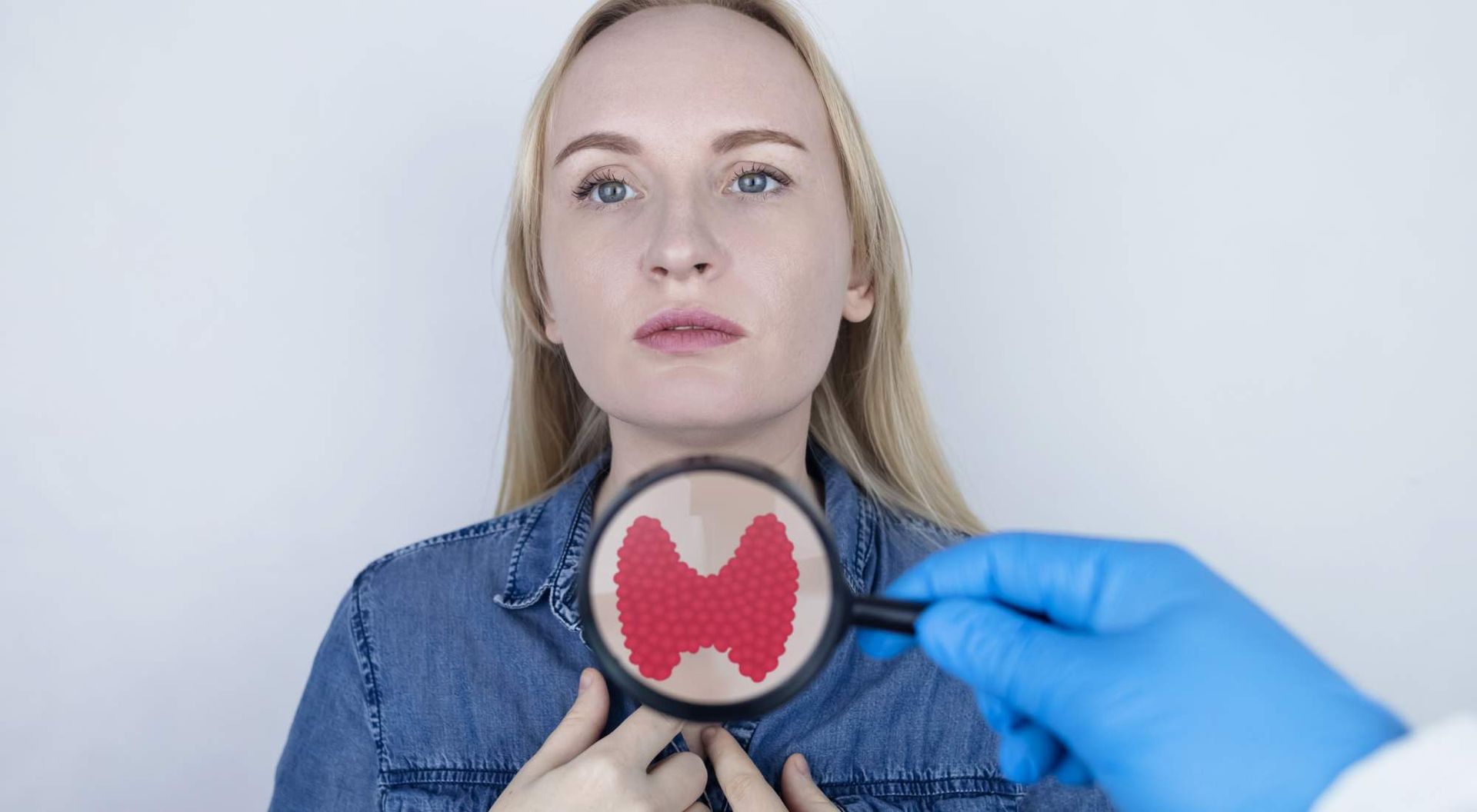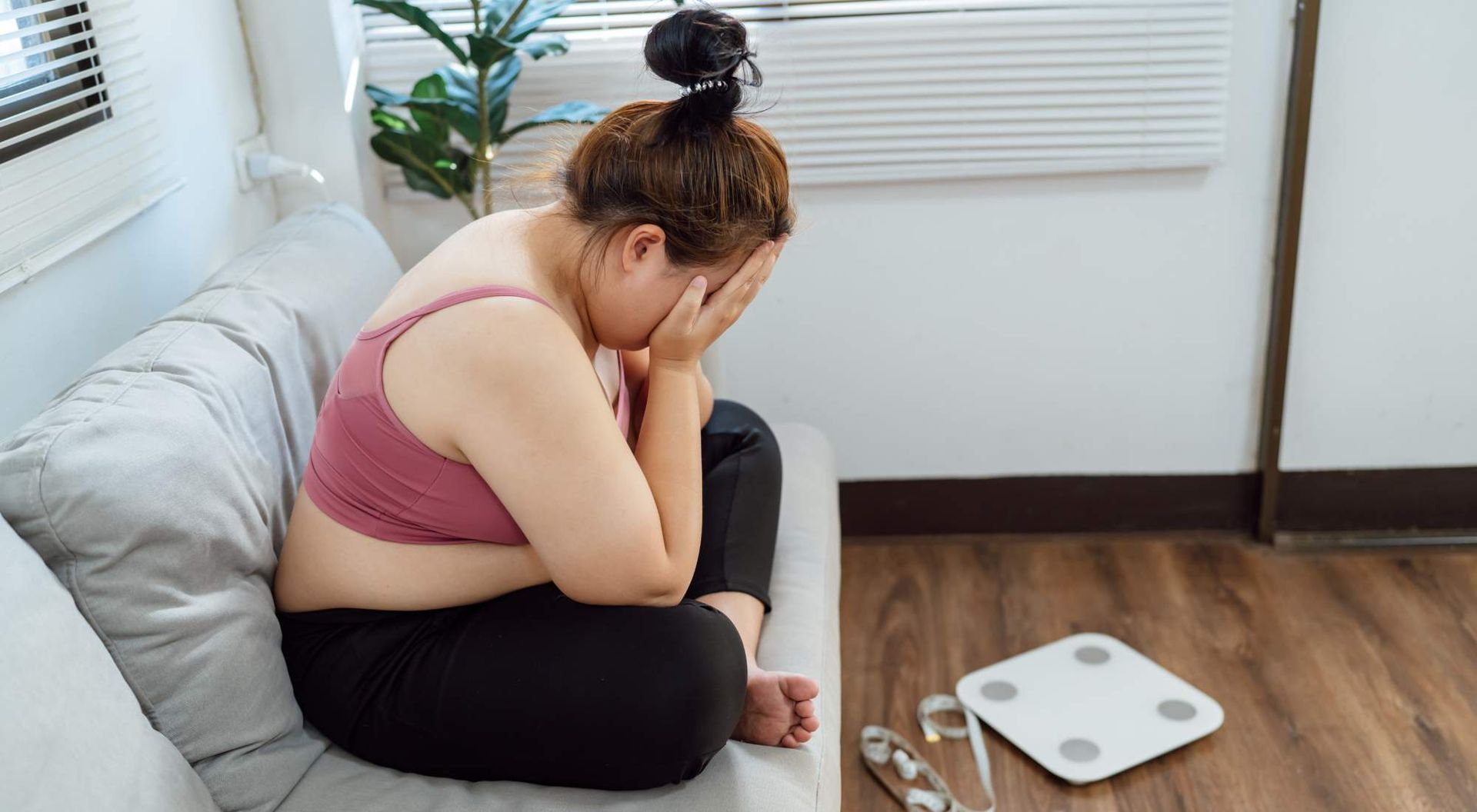Hypothyroidism and Hair Loss: What Is the Connection and What Can You Do About It?
"The content below is not intended to be a substitute for professional medical advice, diagnosis, or treatment. Always seek the advice of your physician or other qualified health provider with any questions you may have regarding a medical condition."
Hypothyroidism is many things. It’s painful. It’s frustrating. It’s tiresome.
Now on top of all the issues your hypothyroidism causes you in your everyday life — you now suspect it is also causing your hair loss.
It’s unfair.
The physiological and psychological impact of hypothyroidism is many things and it presents itself with a variety of symptoms, hair loss included. But what does hypothyroidism-related hair loss mean for you?
In this article, we will discuss how hypothyroidism causes hair loss, what treatment involves, and what you can do to help promote your hair growth in the meantime.
Table of Contents
Does Hypothyroidism Cause Hair Loss?
Yes, hypothyroidism does cause hair loss.
Severe and untreated thyroid disorders can disrupt the hormones associated with hair production. The extent of the hair loss caused by hypothyroidism may range from frequent light shedding to significant loss of hair on large portions of the scalp.
The hair loss is diffuse; meaning it happens all over the scalp, often unevenly. Hair follicles do not grow uniformly. For mild cases of hormone-related hair loss, your hair might appear to be thinning due to the rate at which you lose and regrow hair.
How Long After My Hypothyroidism Diagnosis Might I Expect To See Hair Loss?
If you’ve ever experienced any of the following…
- Chronic exhaustion
- Brain fog
- Cravings for sweets
- Bad breath
- White coating on tongue
- Hormone imbalance
- Loss of sex drive
- Chronic sinus and allergy issues
- Digestive problems (gas and bloating)
- Weak immune system
- Frequent UTIs
- Vaginal itching and discolored discharge
… Candida overgrowth is a very likely culprit. Oftentimes, Candida causes your body’s natural pH to become unbalanced.
So, how can you cure Candida naturally and permanently? Let’s look at some of the most common natural ways.
How Does Hypothyroidism Cause Hair Loss?
Before we get into how this disorder causes hair loss, first let’s talk about how hair grows.
- Hair grows at the root of the follicle. Hair grows from the bulge which is a collection of multipotent stem cells that lie within the root sheath. These stem cells are responsible for hair cycling.
- The blood vessels in the scalp feed the root with the nutrients required to produce keratinocytes that then migrate, flatten, and die to become what we know as keratinized hair. This is called anagen.
- The keratinized hair then separates from the blood supply as it grows from the follicle. This process is called catagen.
- Over time, the hair strand falls out of the follicle. This is called telogen and it is the final phase of hair growth.
- Once the telogen phase is over and the hair strand is shed, the follicle begins the cycle all over again.
The hair loss associated with thyroid disorders is caused when the hair growth cycle is halted in some follicles, causing them to shed early and take a longer time to restart growth cycles.
Our hair continually sheds, but our scalp usually continually regrows it. When follicles throughout the scalp shed hair too early or stop growing strands of hair, it may appear that the hair is thinning or “falling” out.
Hypothyroidism is a hormone disorder that affects the thyroid’s ability to regulate hormones. Since hair growth is directly related to hormone function, the lack of T3 and T4 cells associated with hypothyroidism can cause some hair follicles to shed too early and stop growing.
What Does Thyroid Hair Loss Look Like?
Thyroid-related hair loss can cause the thinning of your eyebrows, eyelashes, head hair, and body hair.
Your hair may also be brittle and fine. Your hair may shed noticeably in clumps or unnoticeably in strands. Hypothyroidism-related hair loss is diffuse so hair loss may not appear as visible balding patches at first.
Hair loss is not just a symptom of hypothyroidism. Other disorders that can cause hair loss include:
- Alopecia
- Cushing’s syndrome
- Hormonal imbalances
- Malnutrition
- Lupus
Contact your doctor if you are experiencing significant hair loss. This could be a sign of hypothyroidism, stress, or other related illnesses.
It is important to note that this hair loss is temporary. Your hair will grow back within months after the treatment for your hypothyroidism begins.
How To Treat Hair Loss Caused by Hypothyroidism
To treat your hypothyroidism, your doctor may prescribe a daily hormone replacement drug called levothyroxine. It will help treat your hypothyroidism and manage the symptoms caused by thyroid dysfunction.
Levothyroxine is a replacement for thyroxine hormones. Since hypothyroidism causes the thyroid to underproduce hormones, levothyroxine is prescribed to make up for the lack of thyroid hormones like T3 or T4.
Unfortunately, hypothyroidism cannot be cured, but hair loss caused by your underactive thyroid is not permanent.
Once you’ve begun treatment, you can expect your hair to slowly regrow over the next few months. In the meantime, there are plenty of ways to naturally encourage hair regrowth!
10 Natural Treatments for Thyroid-Based Hair Loss
Maintaining good health and growth is all about balance.
Health is holistic, so there can be many many different ways to approach it. Practicing and balancing good health does not just happen overnight. It requires dedication to a health routine filled with following your doctor’s orders, nutrition, self-care, and patience.
These natural remedies, along with medication, may help support hair regrowth.
#1: Try Biotin-Rich Foods and Supplements
Biotin is a B vitamin that is found naturally in most foods and is also available as a dietary supplement. It has been known to promote strength and growth in brittle nails and thinning hair.
One double-blind study conducted by The Journal of Clinical and Aesthetic Dermatology found that an oral biotin supplement taken twice daily for 180 days significantly increased hair growth in all control-treated participants. In the first 90 days alone, the control-treated subjects perceived overall improvement in hair volume, scalp coverage, and hair thickness.
Nutrition can be tricky to navigate. Maybe you’re a picky eater. Or maybe you have intolerances to certain foods. You have to travel the road of nutritious eating to maintain your health, especially if you have hypothyroidism.
But you don’t have to do it alone.
Dr. Donna Sergi at
HealthierU may be able to help you develop a nutrient-rich food regimen to help fortify your body against the challenges your hypothyroidism presents.
#2: Boost Your Iron Levels
A common symptom of iron deficiency, also known as anemia, is hair loss.
Iron helps the body produce hemoglobin. Hemoglobin is a protein in your red blood cells that is responsible for carrying oxygen to cells for growth and repair. This includes the cells that promote hair growth.
Iron deficiency, like hypothyroidism, is a disorder that is common among women. Studies have also suggested that iron deficiency is common amongst patients with hypothyroidism and that iron supplements can help improve the efficacy of thyroxine replacement therapy (levothyroxine).
Foods that can boost your iron intake include:
- Spinach
- Tofu
- Lentils
- Red meat
- Eggs
- Nuts
- Beans
- Iron supplements
Be sure to check with your doctor and/or nutrition specialist about the right dose of iron or if you suspect you may have an iron deficiency.
#3: Eat a Balanced Diet
A healthy diet can help keep your hair strong and fortified as well as reduce the risk of health conditions associated with hypothyroidism.
Hypothyroidism may disrupt the body’s ability to absorb micronutrients, so it may be necessary to replenish the essential nutrients in the body with supplements or a nutrient-rich diet.
Nutrients play a significant role in the cellular turnover of the hair growth cycle. This means that our hair follicles need them to keep producing
Aim for foods or supplements containing micronutrients like:
- Zinc
- Magnesium
- Selenium
- Biotin
- Iron
- Lysine
- Vitamin B12
These vitamins and minerals are considered some of the best ”hair growth minerals” that you can ingest. So support your hair regrowth with plenty of:
- Fish
- Leafy greens
- Whole grains and ancient grains
- Beans
- Poultry
- Fish
- Fruit with antioxidants like berries
#4: Address Possible Nutritional Deficiencies
Multiple mineral and vitamin deficiencies may promote hair loss in individuals with or without hypothyroidism. Hair loss is a common symptom of malnutrition and eating disorders. Our body requires a proper and balanced diet to “conduct business as usual.”
Nutritional deficiencies that have been associated with hair loss include:
- Riboflavin
- Biotin
- Iodine
- Folate
- Vitamin B12
Your doctor or nutrition specialist should be able to determine if you have nutritional deficiencies that directly impact your hair growth cycle or hypothyroidism.
Dr. Donna Sergi is Brooklyn's leading natural nutritionist. She has dedicated her life to giving back to her community and others with her passion for natural wellness using nutrition and lifestyle guidance.
Schedule your free nutrition consultation today.
#5: Incorporate Anti-Inflammatory Foods
Inflammation can worsen thyroid symptoms. A diet rich in anti-inflammatory foods like fruits and vegetables may drastically help improve hypothyroid-related symptoms, including hair loss.
Ginger and turmeric are excellent natural anti-inflammatory agents. Other anti-inflammatory foods include:
- Garlic
- Cherries
- Green tea
- Leafy greens
- Oily fish
- Avocado
Avoid inflammatory foods and drinks like:
- Fried foods
- Soda
- Refined carbohydrates
- Red meat
- Alcohol
#6: Experiment With Essential Oils
Hair loss may often be stress-induced. Hypothyroidism can be a stressful chronic condition. Studies show that an overproduction of the stress-related hormone cortisol can lead to hair loss.
Adding mindful practices as a part of your holistic health routine may benefit your mental and physical health. Try to reduce some of your stress with some self-guided breathing, meditation, and aromatherapy.
Essential oils like lavender or chamomile can create a relaxing environment to help you relax while practicing mindfulness.
#7: Try Some Herbs
These herbs have been found to benefit thyroid health. Ask your doctor or nutrition specialist about using:
- Ashwagandha: This herb is popularly used to modulate stress and anxiety. Ashwagandha is a natural anti-inflammatory and may help assist thyroid function. One study suggests that ashwagandha supports thyroid health by reducing oxidative stress and improving thyroid hormones.
- Ginger: Ginger has traditionally been used as an anti-inflammatory, antioxidant, and antibacterial. This herb has been suggested to alleviate symptoms in patients with hypothyroidism.
- Black cumin: Traditionally used in Algeria to treat thyroid conditions, black cumin contains phytochemicals and biological components that help the body function. One 2016 study found that black cumin was effective in normalizing the thyroid status in Hashimoto’s patients. Hashimoto’s disease is a thyroid disorder that causes hypothyroidism due to the body attacking the thyroid.
- Bugleweed: This herb has been found to help the body effectively use
iodine which could help those who are suffering from iodine-related hair loss and thyroid dysfunction.
#8: Be Aware of Your Iodine Intake
The thyroid gland relies on iodine to generate the thyroid hormones that are responsible for the hair growth cycle. Due to this, an iodine deficiency may prevent hair follicles from regenerating.
Iodine deficiencies may also cause hypothyroidism and goiter. Hypothyroidism caused by this deficiency is no longer common in the United States, but certain groups of people may be at risk.
People who may be at risk for developing hypothyroidism due to iodine deficiency include:
- Pregnant people
- People who do not use iodized salt
- Vegans and people who eat little to no dairy, seafood, or eggs
Iodine-rich foods may help prevent iodine-related hypothyroidism or hair loss include:
- Certain fish, such as cod or tuna
- Shrimp, seaweed, and other seafood
- Dairy products like milk, cheese, or yogurt
Avoid taking iodine supplements unless you are prescribed them by your doctor or nutrition specialist. Iodine overconsumption may pose a significant risk to your health.
#9: Treat Your Hair Gently
While hypothyroidism can cause hair to thin out and cease growth, it can also alter the texture of the strands of hair.
Hypothyroidism may often cause hair to become brittle.
Brittle hair can be prone to breakage. Brittle hair can easily break when brushing while wet. Take care of your hair by using a wet brush to avoid damaging wet hair. Be sure not to brush too hard and to brush from the root.
Leave-in conditioner applied after bathing or showering may also help reduce the damage caused by heat like a curler or blow dryer. You can also use a silk head scarf, bonnet, or pillowcase to avoid hair breakage due to friction from your pillow while sleeping.
Avoid overusing rubber hair bands when putting your hair up. Scrunchies or hair clips can allow you to have your hair up without causing damage.
#10: Be Patient
There is no miracle cure for thyroid-related hair loss.
Making lifestyle changes that encourage hair regrowth may take:
- Time
- Practice
- Routine
Hair regrowth doesn’t happen overnight. It may take some time before your lifestyle routine, coupled with the treatment for your hypothyroidism, begins to show noticeable regrowth.
Be patient and be gentle with yourself and your hair. Hair loss can have a psychological impact on you and your self-image.
In the meantime — head accessories are in this year! So try wearing a headband, hat, or headscarf until you’re comfortable with your hair. There are never-ending options in style and color that you can accessorize.
Have fun with it, use it as an excuse to go shopping, and don’t be surprised when you get compliments on your fashionable taste.
HealthierU’s Holistic Approach Can Help Address Symptoms of Hypothyroidism — Including Hair Loss
Your body knows what’s wrong with it.
When you’re not feeling well or feeling insecure about your hair loss, it can be difficult to listen to what your body is saying. You may even need help providing it with what it wants.
This is where Dr. Donna Sergi and HealthierU can help.
As a woman’s health, wellness, and nutrition expert, Dr. Sergi has been helping women reconnect and communicate with their bodies to help them manage their chronic disorders like hypothyroidism.
Learn more or
contact us today for your free holistic nutrition consultation.

